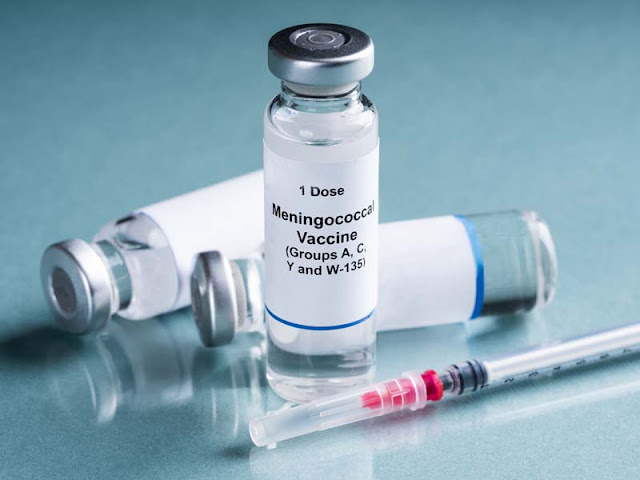Meningococcal Vaccines: Protecting Against a Deadly Disease
 |
| Meningococcal Vaccines |
Meningococcal disease is a
serious bacterial infection that can cause meningitis, an infection of the
membranes that surround the brain and spinal cord, or sepsis, an infection of
the bloodstream. While meningococcal disease is not very common overall, it can
be deadly and serious disability can occur in those infected. As such, preventing
meningococcal disease through effective vaccines is extremely important.
What are Meningococcal Bacteria?
Meningococcal bacteria are
normally found in the nose and throat of healthy carriers. However, in some
cases the bacteria can invade the body and cause serious illness. There are
several distinct serogroups of meningococcal bacteria that can cause disease,
named by their protective sugar coatings: A, B, C, W, and Y. Globally, the most
common disease-causing serogroups are A, B and C.
According to the Centers for
Disease Control and Prevention (CDC), approximately 1,000 to 1,200 Americans
get meningococcal disease each year and 10 to 15 percent of those who contract
the disease die from it, despite treatment with antibiotics. Meningococcal
disease kills approximately 10 to 15 percent of those infected even with
treatment. Of those who survive, about 10 to 20 percent may suffer from
permanent disabilities such as hearing loss, neurological damage or limb
amputations.
Symptoms and Diagnosis of Meningococcal Disease
It is important to be aware of
the signs and symptoms of meningococcal
disease so that medical treatment can be sought quickly. Early symptoms
may appear similar to the flu, including fever, headache, nausea, vomiting and
stiff neck. A petechial or purpuric rash may appear later. Diagnosis involves
isolating the bacteria from spinal fluid or blood samples. Prompt treatment with
antibiotics is crucial as the illness can progress very rapidly and cause death
within hours if left untreated.
Available Vaccines for Prevention
Fortunately, safe and effective
vaccines are available to help prevent the most common strains of meningococcal
disease. The CDC recommends routine vaccination against serogroups A, C, W and
Y for all children and teens. Additionally, certain high-risk groups such as
college freshman living in dormitories are recommended to receive vaccination
against serogroup B as well.
Meningococcal Conjugate Vaccines
Two different types of
meningococcal conjugate vaccines are used in the US to help prevent
meningococcal serogroups A, C, W and Y disease. Both vaccines contain
polysaccharide (sugar molecules) from the meningococcal bacteria that are
attached or conjugated to a protein to enhance the body's immune response. The
two available conjugated vaccines are:
- Menactra (Sanofi Pasteur):
Approved for ages 9 months-55 years. Provides protection against serogroups A,
C, W and Y.
- Menveo (GlaxoSmithKline):
Approved for ages 2-55 years. Provides protection against serogroups A, C, W
and Y.
Both of these conjugate vaccines
have been shown to be highly effective at preventing meningococcal disease from
serogroups A, C, W and Y when given according to CDC recommendations. Side
effects of the conjugate vaccines are generally mild, including soreness at the
injection site and low-grade fever.
Meningococcal Serogroup B
Vaccines
There are also two serogroup B
meningococcal vaccines available with slightly different approval ages:
- Bexsero (GlaxoSmithKline):
Approved for ages 10-25 years. Provides protection against serogroup B
meningococcal disease.
- Trumenba (Pfizer): Approved for
ages 10-25 years. Provides protection against serogroup B meningococcal
disease.
The serogroup B meningococcal
vaccines work differently than the conjugate vaccines. Instead of targeting the
polysaccharide capsule, they target unique proteins on the bacterial surface.
Clinical trials have demonstrated high estimated effectiveness against
serogroup B invasive meningococcal disease. However, vaccine-induced immunity
from the serogroup B vaccines appears to require additional booster doses for
optimal duration of protection. As such, a 2-dose series is recommended for
Trumenba and a 2- or 3-dose series is recommended for Bexsero depending on age.
Importance of Adhering to Vaccination Recommendations
While meningococcal disease is rare
in the United States, it strikes almost 1,000 Americans each year. Even with
antibiotic treatment, it kills 10-15 percent of those infected. Survivors may
be left with severe complications such as neurological damage or limb
amputations in up to 20 percent of cases. As such, following CDC
recommendations to vaccinate against meningococcal disease is crucial for
protecting both individuals and communities. Parents should consult their
child's pediatrician about recommended vaccination schedules. College students,
military recruits and those with certain medical conditions should also ensure
they receive appropriate meningococcal vaccination. By adhering to these
recommendations, we can help decrease cases of meningococcal disease and its
potentially devastating health impacts.
In conclusion, while
meningococcal disease cannot be completely prevented, safe and effective
vaccines exist that can help reduce cases drastically when widely used as part
of routine vaccination programs. Following CDC meningococcal vaccination
guidelines is critical for individual and public health protection from this
serious bacterial illness. With vaccine-induced herd immunity, fewer
opportunities exist for outbreaks to take hold. Understanding the importance of
meningococcal disease prevention through vaccination is key.
Get More Insights Here
https://coolbio.org/system-on-a-chip-soc-the-future-of-electronics/
https://www.newsanalyticspro.com/protecting-the-community-from-a-deadly-disease


Comments
Post a Comment